初中英语奥林匹克竞赛[1]
- 格式:doc
- 大小:41.50 KB
- 文档页数:4

奥林匹克竞赛初一英语作文I love the Olympic Games because they bring together athletes from all around the world to compete in various sports. It's amazing to see people of differentnationalities and backgrounds coming together to celebrate the spirit of sportsmanship and competition.The Olympic Games are a great opportunity for athletes to showcase their talent and hard work on a global stage. It's inspiring to see them push themselves to the limit and strive for excellence in their chosen sport.One of my favorite things about the Olympics is watching the opening ceremony. It's always so grand and spectacular, with performances and displays that showcase the host country's culture and history. It's a great way to kick off the games and get everyone excited for the competitions ahead.I also love watching the different sports during theOlympics. From swimming to gymnastics to track and field, there's always something exciting to watch. It's amazing to see the skill and dedication of the athletes as they compete for gold.Overall, the Olympic Games are a celebration of unity, diversity, and the power of sports to bring people together. It's a time to cheer for your country and show support for all the athletes who have worked so hard to get to where they are. I can't wait for the next Olympics to come around so I can experience the excitement all over again.。
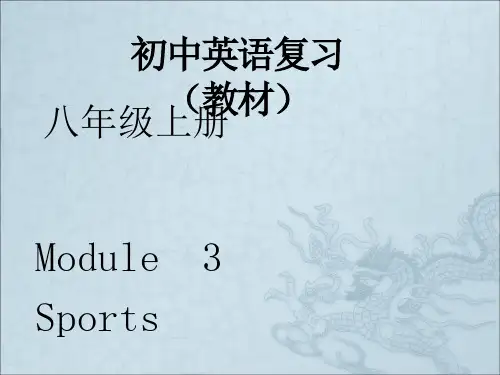
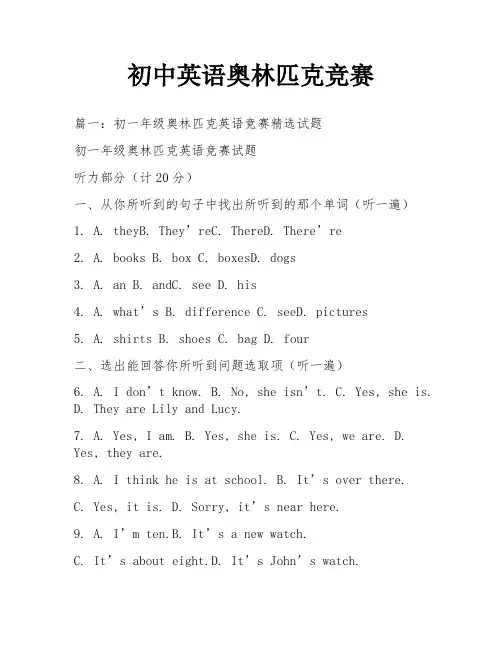
初中英语奥林匹克竞赛篇一:初一年级奥林匹克英语竞赛精选试题初一年级奥林匹克英语竞赛试题听力部分(计20分)一、从你所听到的句子中找出所听到的那个单词(听一遍)1. A. theyB. They’reC. ThereD. There’re2. A. books B. box C. boxesD. dogs3. A. an B. andC. see D. his4. A. what’s B. difference C. seeD. pictures5. A. shirts B. shoes C. bag D. four二、选出能回答你所听到问题选取项(听一遍)6. A. I don’t know. B. No, she isn’t. C. Yes, she is.D. They are Lily and Lucy.7. A. Yes, I am. B. Yes, she is. C. Yes, we are. D. Yes, they are.8. A. I think he is at school. B. It’s over there.C. Yes, it is.D. S orry, it’s near here.9. A. I’m ten.B. It’s a new watch.C. It’s about eight.D. It’s John’s watch.10. A. I like it. B. Thanks. C. OK D. You’re right.三、对话理解A.根据你所听到的对话,选出能正确回答所提问题的选项(听两遍)11. A. Yes, he is. B. Yes, he is English.C. No, he isn’t. D. No, he is from America.12. A. The man in black trousers. B. He is black.C. The one in a black coat.D. The man in the house is Mr. Black.13. A. Behind the door.B. I don’t know. C. It’s over there.D. I don’t think so.B.根据你所听到的对话,选出能完成所给句子的正确选项(听两遍)14. Kate asks Emma to _____her watch.A. look likeB. look the sameC. takeD. take care of15. _____ finds ___ watch and gives it to ____ at last (最后).A. Kate, Lucy’s, LucyB. Lucy, Kate’s, EmmaC. Lucy, Lucy’s, KateD. Kate, Emma’s , Emma四、根据你所听到的短文内容填空(听两遍)16. Jim and his family are ________. 17. Jim and his sister are in _____ classes.18. Jim and Kate are Mr. And Mrs. Brown’s ________.19. Kate is a ________ like his brother.20. Jim’s ________ isn’t our English teacher.笔试部分(计80分)一、单项选择(20分)A.英语常识21.英语中有两个字母可以单独成词,是:()A. OUB. YOC. IAD. YUE. IO22.指出下列所给五个选项中,哪一组意思是表示“中国民航”和“特别行政区”:()A. BEC,SARB. PRC,IOCP,WTOD. MBA,CBCE.CAAC,SAR23. 总的说来,英语名词可以分为:()A.可数名词和不可数名词B.单数名词和复数名词C.专有名词和复数名词D.普通名词和不可数名词E.专有名词和普通名词24.在英汉两种语言中,英语是以()为单位的,汉语是以()为单位的。
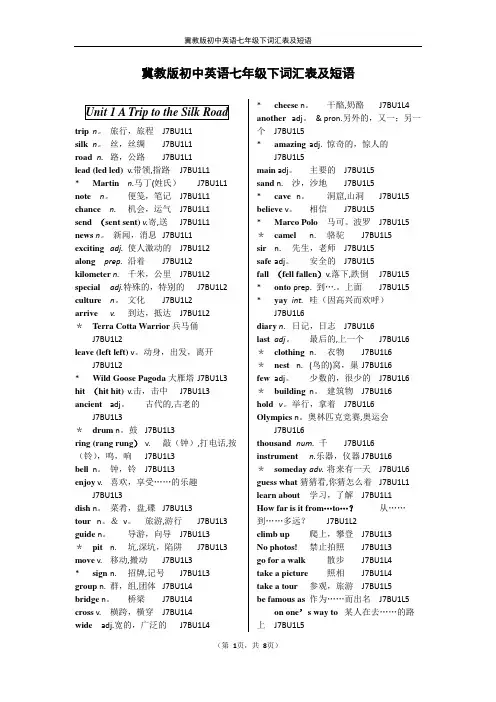
冀教版初中英语七年级下词汇表及短语trip n。
旅行,旅程J7BU1L1silk n。
丝,丝绸J7BU1L1road n.路,公路J7BU1L1lead (led led)v.带领,指路J7BU1L1* Martin n.马丁(姓氏)J7BU1L1 note n。
便笺,笔记J7BU1L1 chance n.机会,运气J7BU1L1send (sent sent)v.寄,送J7BU1L1 news n。
新闻,消息J7BU1L1exciting adj.使人激动的J7BU1L2 along prep.沿着J7BU1L2 kilometer n.千米,公里J7BU1L2 special adj.特殊的,特别的J7BU1L2 culture n。
文化J7BU1L2arrive v.到达,抵达J7BU1L2*Terra Cotta Warrior兵马俑J7BU1L2leave (left left) v。
动身,出发,离开J7BU1L2* Wild Goose Pagoda大雁塔J7BU1L3 hit (hit hit)v.击,击中J7BU1L3 ancient adj。
古代的,古老的J7BU1L3*drum n。
鼓J7BU1L3ring (rang rung) v. 敲(钟),打电话,按(铃),鸣,响J7BU1L3bell n。
钟,铃J7BU1L3enjoy v. 喜欢,享受……的乐趣J7BU1L3dish n。
菜肴,盘,碟J7BU1L3tour n。
&v。
旅游,游行J7BU1L3 guide n。
导游,向导J7BU1L3*pit n. 坑,深坑,陷阱J7BU1L3 move v. 移动,搬动J7BU1L3* sign n. 招牌,记号J7BU1L3 group n. 群,组,团体J7BU1L4bridge n。
桥梁J7BU1L4cross v. 横跨,横穿J7BU1L4wide adj.宽的,广泛的J7BU1L4 * cheese n。
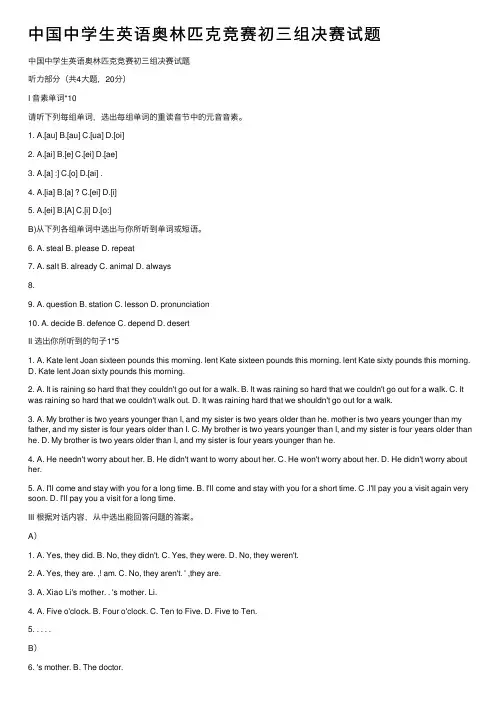
中国中学⽣英语奥林匹克竞赛初三组决赛试题中国中学⽣英语奥林匹克竞赛初三组决赛试题听⼒部分(共4⼤题,20分)I ⾳素单词*10请听下列每组单词,选出每组单词的重读⾳节中的元⾳⾳素。
1. A.[au] B.[au] C.[ua] D.[oi]2. A.[ai] B.[e] C.[ei] D.[ae]3. A.[a] :] C.[o] D.[ai] .4. A.[ia] B.[a] ? C.[ei] D.[i]5. A.[ei] B.[A] C.[i] D.[o:]B)从下列各组单词中选出与你所听到单词或短语。
6. A. steal B. please D. repeat7. A. salt B. already C. animal D. always8.9. A. question B. station C. lesson D. pronunciation10. A. decide B. defence C. depend D. desertII 选出你所听到的句⼦1*51. A. Kate lent Joan sixteen pounds this morning. lent Kate sixteen pounds this morning. lent Kate sixty pounds this morning.D. Kate lent Joan sixty pounds this morning.2. A. It is raining so hard that they couldn't go out for a walk. B. It was raining so hard that we couldn't go out for a walk. C. It was raining so hard that we couldn't walk out. D. It was raining hard that we shouldn't go out for a walk.3. A. My brother is two years younger than I, and my sister is two years older than he. mother is two years younger than my father, and my sister is four years older than I. C. My brother is two years younger than I, and my sister is four years older than he. D. My brother is two years older than I, and my sister is four years younger than he.4. A. He needn't worry about her. B. He didn't want to worry about her. C. He won't worry about her. D. He didn't worry about her.5. A. I'll come and stay with you for a long time. B. I'll come and stay with you for a short time. C .I'll pay you a visit again very soon. D. I'll pay you a visit for a long time.III 根据对话内容,从中选出能回答问题的答案。

奥林匹克竞赛语言学试题一、选择题(每题2分,共20分)1. 以下哪个选项是汉语中的声母?A. āB. ēC. āiD. āng2. 在英语中,以下哪个词属于不规则动词?A. goB. runC. eatD. write3. 语言学中的“形态学”主要研究的是:A. 语言的发音B. 语言的语法结构C. 语言的词汇构成D. 语言的书写系统4. 以下哪个选项是日语中的平假名?A. あB. アC. かD. カ5. 语言学中的“语用学”主要研究的是:A. 语言的发音规则B. 语言的语法规则C. 语言的使用情境D. 语言的词汇意义二、填空题(每空1分,共10分)6. 汉语中的“四声”指的是________、________、________、________。
7. 英语中的定冠词是________,而不定冠词是________和________。
8. 在语言学中,“双关语”指的是________和________同时存在的一种语言现象。
三、简答题(每题10分,共20分)9. 请简述什么是“同源词”,并给出两个例子。
10. 解释“语境”在语言学中的重要性,并举例说明。
四、分析题(每题15分,共30分)11. 请分析以下句子的结构,并指出其主语、谓语和宾语:- “学生们在图书馆里安静地学习。
”12. 请分析以下语言现象,并解释其在语言发展中的作用:- 语言的借用(Borrowing)现象。
五、论述题(共20分)13. 论述语言多样性对文化传承的重要性,并提出你的观点。
注意事项:- 请在规定时间内完成试题。
- 答题前请仔细阅读题目要求。
- 保持答题卡整洁,以便评分。
祝你好运!请注意,以上内容仅为模拟试题,实际的奥林匹克竞赛语言学试题可能会有所不同。
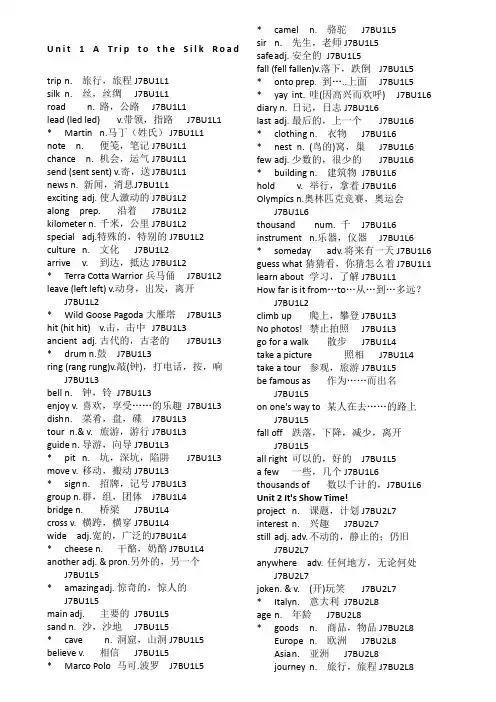
U n i t1A T r i p t o t h e S i l k R o a d trip n. 旅行,旅程 J7BU1L1silk n. 丝,丝绸J7BU1L1road n. 路,公路J7BU1L1lead (led led) v.带领,指路J7BU1L1* Martin n.马丁(姓氏) J7BU1L1note n. 便笺,笔记 J7BU1L1chance n. 机会,运气 J7BU1L1send (sent sent) v.寄,送 J7BU1L1news n. 新闻,消息 J7BU1L1exciting adj. 使人激动的 J7BU1L2along prep. 沿着J7BU1L2kilometer n. 千米,公里 J7BU1L2special adj.特殊的,特别的 J7BU1L2 culture n. 文化J7BU1L2arrive v. 到达,抵达 J7BU1L2* Terra Cotta Warrior兵马俑J7BU1L2 leave (left left) v.动身,出发,离开J7BU1L2* Wild Goose Pagoda大雁塔J7BU1L3hit (hit hit) v.击,击中J7BU1L3ancient adj. 古代的,古老的J7BU1L3* drum n.鼓J7BU1L3ring (rang rung)v.敲(钟),打电话,按,响J7BU1L3bell n. 钟,铃J7BU1L3enjoy v. 喜欢,享受……的乐趣J7BU1L3 dish n. 菜肴,盘,碟J7BU1L3tour n.& v. 旅游,游行 J7BU1L3guide n. 导游,向导 J7BU1L3* pit n. 坑,深坑,陷阱J7BU1L3 move v. 移动,搬动 J7BU1L3* sign n. 招牌,记号 J7BU1L3group n. 群,组,团体J7BU1L4bridge n. 桥梁J7BU1L4cross v. 横跨,横穿 J7BU1L4wide adj.宽的,广泛的J7BU1L4* cheese n. 干酪,奶酪 J7BU1L4 another adj. & pron.另外的,另一个J7BU1L5* amazing adj. 惊奇的,惊人的J7BU1L5main adj. 主要的J7BU1L5sand n. 沙,沙地J7BU1L5* cave n. 洞窟,山洞 J7BU1L5 believe v. 相信J7BU1L5* Marco Polo 马可.波罗J7BU1L5 * camel n. 骆驼J7BU1L5sir n. 先生,老师 J7BU1L5safe adj. 安全的J7BU1L5fall (fell fallen)v.落下,跌倒J7BU1L5* onto prep. 到…..上面J7BU1L5* yay int. 哇(因高兴而欢呼) J7BU1L6 diary n. 日记,日志 J7BU1L6last adj. 最后的,上一个J7BU1L6* clothing n. 衣物J7BU1L6* nest n. (鸟的)窝,巢J7BU1L6 few adj. 少数的,很少的J7BU1L6* building n. 建筑物J7BU1L6hold v. 举行,拿着 J7BU1L6 Olympics n.奥林匹克竞赛,奥运会J7BU1L6thousand num. 千J7BU1L6 instrument n.乐器,仪器J7BU1L6* someday adv. 将来有一天 J7BU1L6 guess what猜猜看,你猜怎么着 J7BU1L1 learn about 学习,了解 J7BU1L1How far is it from…to…从…到…多远?J7BU1L2climb up 爬上,攀登 J7BU1L3No photos! 禁止拍照J7BU1L3go for a walk 散步J7BU1L4take a picture 照相J7BU1L4 take a tour 参观,旅游 J7BU1L5be famous as 作为……而出名J7BU1L5on one's way to 某人在去……的路上J7BU1L5fall off 跌落,下降,减少,离开J7BU1L5all right 可以的,好的J7BU1L5a few 一些,几个 J7BU1L6 thousands of 数以千计的,J7BU1L6 Unit 2 It's Show Time!project n. 课题,计划 J7BU2L7 interest n. 兴趣J7BU2L7still adj. adv. 不动的,静止的;仍旧J7BU2L7anywhere adv. 任何地方,无论何处J7BU2L7joke n. & v. (开)玩笑J7BU2L7* Italy n. 意大利J7BU2L8age n. 年龄J7BU2L8* goods n. 商品,物品 J7BU2L8 Europe n. 欧洲J7BU2L8Asia n. 亚洲J7BU2L8journey n. 旅行,旅程 J7BU2L8king n. 国王J7BU2L8coal n. 煤J7BU2L8discover v. 发现,了解 J7BU2L8invent v. 发明,创造 J7BU2L8other adj. 别的,其它的J7BU2L9describe v. 描写,描述 J7BU2L9build (built built) v. 修建,建造J7BU2L9ago adv. 前,以前J7BU2L9army n. 军队,陆军 J7BU2L9* clay n. 黏土J7BU2L9* soldier n. 战士,士兵 J7BU2L9 important adj. 重要的J7BU2L9tool n. 工具,用具 J7BU2L9* desert n. 沙漠,荒漠 J7BU2L9 more(many, much的比较级)较多J7BU2L9* Lily n. 莉莉(女名)J7BU2L9 realize v. 认识,实现 J7BU2L10rich adj. 丰富,富有的J7BU2L10western adj.西方的,西式的 J7BU2L10 violin n. 小提琴J7BU2L10* dancer n. 跳舞的人J7BU2L10 online adj. 在线的,联网的J7BU2L11especially adv. 尤其,特别 J7BU2L11 treasure n. 宝物,财富 J7BU2L11end n. 最后,末端 J7BU2L11product n. 产品,结果 J7BU2L11worth adj. 值得(做某事),J7BU2L11 * hand-made adj. 手工的J7BU2L11 taste v. 尝起来,品尝,体验J7BU2L11* Dora n. 多拉(人名) J7BU2L11* Monica n.莫尼卡(人名) J7BU2L11 true a dj. 真实的,正确的J7BU2L11 * supper n. 晚餐J7BU2L11* Paul n. 保罗(男名) J7BU2L11once adv. 从前,一度,一次J7BU2L11* blog n. 博客(网络电子日记) J7BU2L12experiencev.&n.体验经历,经验J7BU2L12alive adj. 活着的,有活力的J7BU2L12own adj. 自己的J7BU2L12should v. aux 应该,将要 J7BU2L12anyone pron.任何人无论谁J7BU2L12 suggestion n. 建议J7BU2L12 * yum int. 好吃,或气味非常好J7BU2L12places of interest名胜古迹J7BU2L7talk about 谈论J7BU2L7make a joke 开玩笑,讲笑话J7BU2L7work on 从事于,努力改善或完成J7BU2L7at the age of 在……岁时 J7BU2L8be new to 对…..陌生J7BU2L8try one's best 尽力J7BU2L9a long time ago很久以前J7BU2L9well done做得好J7BU2L9a little bit一点点J7BU2L9make…from…用……制作 J7BU2L9think about 考虑J7BU2L10can't wait to do迫不及待要做事J7BU2L10play music 演奏音乐J7BU2L10I hope so. 我希望如此 J7BU2L10take part in 参加,参与 J7BU2L10get back 回来J7BU2L12Unit 3 School Lifelife n. 生活J7BU3L13term n. 学期J7BU3L13start v. 开始,出发 J7BU3L13finish v. 完成,结束 J7BU3L13twice adv.两次,两倍J7BU3L13win (won won) v.赢得,获胜J7BU3L13 * yeah int. (口语)是,对J7BU3L13 social adj.社会的J7BU3L13* shop n. 手工艺课J7BU3L13myself pron. 我自己J7BU3L13* Edmonton埃德蒙顿 J7BU3L14middle adj.中等的J7BU3L14*Greenwood Middle School 格林伍德中学7BU3L14grade n. 年级J7BU3L14* wood n. 木头,木材 J7BU3L14print v. 印图案于,印刷J7BU3L14guitar n. 吉它J7BU3L14fair n. 展览会J7BU3L14* worm n. 蠕虫J7BU3L14* silk worm蚕J7BU3L14difference n.差异,差别J7BU3L15village n. 村庄,乡村 J7BU3L15* education n.教育J7BU3L15yourself pron.你自己J7BU3L15drop v.放弃,停止J7BU3L15possible adj.可能的J7BU3L15never adv.从来没有,决不J7BU3L15future n. 未来J7BU3L15* Jason Glen杰森.格伦(人名) J7BU3L16 * Riverside High School河畔中学J7BU3L16terrible adj.可怕的,非常严重的J7BU3L16happen v.发生J7BU3L16lose (lost lost) v. 失去,失败J7BU3L16fire n.火,火灾J7BU3L16raise v.筹募(钱财) J7BU3L16prize n.奖品,奖赏J7BU3L17video n.录像,视频J7BU3L17piece n.张,片J7BU3L17visitor n. 参观者J7BU3L17teach (taught taught) v. 讲授J7BU3L18quite adv.非常,十分J7BU3L18nervous adj.紧张的,不安的 J7BU3L18comfortable adj.舒服的J7BU3L18* relaxed adj.轻松的,放松的J7BU3L18 helpful adj.有用的,有帮助的J7BU3L18How is…going…怎么样?J7BU3L13sports meet 运动会J7BU3L13twice a week /year 一周两次J7BU3L13long /high jump 跳远/跳高J7BU3L13be good at 擅长J7BU3L13social studies 社会科学J7BU3L13by oneself 独立地,单独J7BU3L13on one's own 单独,独自 J7BU3L14make a difference 有作用J7BU3L15give up 放弃J7BU3L15drop out of school 退学,辍学J7BU3L15in the future 将来J7BU3L15come up with 想出,提出(主意、答案等) J7BU3L16car wash 洗车(筹款) J7BU3L16cookie sale 卖饼干(筹款) J7BU3L16win first prize 赢得一等奖 J7BU3L17be interested in 对…感兴趣 J7BU3L17a piece of 一片/张…... J7BU3L17different kinds of 不同种类的 J7BU3L17move from…to…从…移动J7BU3L18Unit 4 After-School Activitiesactivity n. 活动J7BU4L19 * Steven 史蒂文(男名) J7BU4L19 volleyball n.排球,排球运动J7BU4L19 practice n. & v. 练习J7BU4L19chess n. 国际象棋J7BU4L19club n. 俱乐部,社团J7BU4L19* volunteer v. n. 自愿帮助,志愿者J7BU4L19* bingo n.宾戈游戏J7BU4L19both adj. pron. 二者(的)J7BU4L19nothing n. &pron. 无事,无物J7BU4L19join v.参加J7BU4L20improve v.提高,改善J7BU4L20* thinking adj.思想的,理性的 J7BU4L20 skill n.技能,技巧J7BU4L20challenge v. & n.挑战 J7BU4L20meeting n.聚会,会议J7BU4L20act v. & n.行动,扮演J7BU4L20useful adj.有用的,有益的J7BU4L20 role n.职能,角色J7BU4L20team n.队,组J7BU4L20shape n.样子,形状 J7BU4L20level n.水平,标准,质量J7BU4L20pool n.水池,水塘J7BU4L20* type n.类型,种类J7BU4L21* following adj.接着的,下述的J7BU4L21which adj. &pron.哪(那)一个J7BU4L21 circle v. n.圈出,圆J7BU4L21add v.加,增加,添加J7BU4L21score n.得分J7BU4L21relax v.放松,休息J7BU4L21free adj.空闲的,自由的 J7BU4L21mind n.头脑,思想J7BU4L21active adj.积极的,活跃的J7BU4L21 * quietly adv.安静地,平静地J7BU4L21 must v. aux必须,应当J7BU4L21without prep.没有,不用J7BU4L21 bored adj.无聊的,无趣的J7BU4L21 example n.例如,范例J7BU4L21hurry n. & v.赶紧,匆忙J7BU4L22somewhere adv.在某处J7BU4L22* actually adv.的确,真实地J7BU4L22 * cooking n.烹调J7BU4L22* surf v.冲浪J7BU4L22Internet n.因特网,互联网J7BU4L22 housework n. 家务劳动J7BU4L22 phone n. v.电话,打电话J7BU4L23* bookworm n.书迷,书虫J7BU4L23 anything pron.任何事物,某事J7BU4L23* grocery n.杂货J7BU4L23expensive adj. 昂贵的J7BU4L23* yummy adj.好吃的,美味的J7BU4L24 everybody pron.每人,人人J7BU4L24come over 过来,来访 J7BU4L19do well in在…方面做得好J7BU4L19make friends交朋友J7BU4L20at the same time 同时J7BU4L20enjoy doing 享受……,喜欢…….J7BU4L20stay in shape 保持体型J7BU4L20add up 把……加起来J7BU4L21in one's free time 在某人的闲暇时间7BU4L21play an instrument弹奏乐器J7BU4L21go on a trip 旅游,游玩 J7BU4L21for example 例如J7BU4L21have lunch 吃午饭J7BU4L22in a hurry to do 匆忙做…… J7BU4L22surf the Internet 网上冲浪,J7BU4L22help …with帮助……做……J7BU4L22I would love …我想……J7BU4L22on the phone 在通电话J7BU4L23 have a great /good weekend 周末玩得愉J7BU4L24take a bus乘公共汽车J7BU4L24It's …away from 从…到..有多长时间(或多远距)Unit5 I Love Learning English!foreign adj.外国的J7BU5L25could v.aux能,可能J7BU5L25* loudly adv.高声地,吵闹地J7BU5L25 understand (understood understood) v懂得,理解cartoon n.动画片,漫画J7BU5L25 Canadian adj. n.加拿大(人)的,J7BU5L25 Alicia艾丽西娅(女名) J7BU5L26Russia n. 俄罗斯J7BU5L26reply n.&v. 回答,答复 J7BU5L26competition n. 比赛,竞赛 J7BU5L26proud adj.自豪的,引以为荣的J7BU5L26such adj.那么的,这样的 J7BU5L26letter n.字母J7BU5L27exactly adv.确切地,精确地J7BU5L27fact n.事实,真实的事物J7BU5L27sentence n.句子J7BU5L27quick adj.快的,迅速的J7BU5L27* fox n.狐狸J7BU5L27lazy adj.懒惰的J7BU5L27* forwards (=forward) adv.向前 J7BU5L27 * backwards (=backward) adv.向后,倒* therein adv.在那里,在其中J7BU5L27 even adv. 甚至,还,其实J7BU5L27dig (dug dug) v.挖,掘J7BU5L27* Teresa 特里萨(人名) J7BU5L28* Hong Kong 香港J7BU5L28* storybook n.故事书J7BU5L28magazine n.杂志 J7BU5L28newspaper n.报纸J7BU5L28mistake n.错误J7BU5L28silly adj.愚蠢的,傻的J7BU5L28* Susan苏珊(女名) J7BU5L28oops int.哎哟,啊呀(摔倒或出小错时用) article n. 文章J7BU5L29* opportunity n.机会J7BU5L29knowledge n.知识,学问J7BU5L29communicate v.交流J7BU5L29connect v.连接,联结J7BU5L29* pal n.伙伴,朋友J7BU5L30* Jessica 杰西卡(男名) J7BU5L30 introduce v.介绍 J7BU5L30have a good talk谈得很好J7BU5L25 Good for you! 干得好,好样的J7BU5L26be proud of…为…感到骄傲J7BU5L26in fact事实上J7BU5L27dig in开始认真工作,钻研J7BU5L27 look up查阅,查找J7BU5L28enjoy oneself 玩得痛快, J7BU5L28 in /after class 课上/下 J7BU5L28be afraid to do …害怕做……J7BU5L28make a mistake /mistakes 犯(一个)错误laugh at 嘲笑,取笑 J7BU5L28right now现在,目前J7BU5L28a door to…通向……的门J7BU5L29communicate with…与……交流ask for 寻求帮助,要求得到J7BU5L29help…(to) do 帮助……做…J7BU5L29connect …with把…和…联系起来play chess下象棋J7BU5L30try to do …努力做……. J7BU5L30look forward to…期待J7BU5L30 Unit6 Seasonsstrange adj.奇怪的,奇特的,不熟悉的J7BU6L31notice v. n.注意到,看到;布告,启事J7BU6L31* wild a dj.怪异的,荒诞的,野生的J7BU6L31 wake (woke woken) v.醒J7BU6L31* surprised adj. 感到惊讶的 J7BU6L31 become (became become) v.变得,成为7BU6L31dark adj. & n.黑暗(的) J7BU6L31* ski v.滑雪J7BU6L31* snowball n.雪球J7BU6L31research n. & v.研究,调查J7BU6L32website n.网站J7BU6L32hill n.山丘,小山J7BU6L32ice n.冰J7BU6L32* snowman n.雪人J7BU6L32clear adj. 晴朗的,明亮的,清澈的J7BU6L32temperature n.温度J7BU6L33pie n.馅饼J7BU6L33* clap v. & n.拍手,鼓掌J7BU6L33* happily adv.幸福地,满足地J7BU6L33 * maple n.枫树J7BU6L34* syrup n.糖浆J7BU6L34* goose (pl. geese) n. (加拿大)雁,鹅J7BU6L34* honk n.鹅(雁)声,汽车喇叭声J7BU6L34cloud n.云J7BU6L34wet adj.湿的J7BU6L34* surfing n.冲浪运动J7BU6L35* mate n.朋友,伙伴J7BU6L35* Aaron 艾伦(女名) J7BU6L35reach v.到达,达到J7BU6L35degree n. 度数,度J7BU6L35sea n.海洋,海J7BU6L35* surfboard n.冲浪板J7BU6L35popular adj.流行的,普及的J7BU6L35 * surfer n.冲浪者J7BU6L35everywhere adv.到处,处处J7BU6L36strawberry n. 草莓J7BU6L36wake up 醒来J7BU6L31go away 消失J7BU6L31go swimming /skiing /skating 去游泳/滑雪J7BU6L31have snowball fights打雪仗J7BU6L31Good /Great work!做得好J7BU6L31wait for 等待J7BU6L32do some research 做研究J7BU6L32get …together召集……J7BU6L32It is a great season for这是……的好季节。
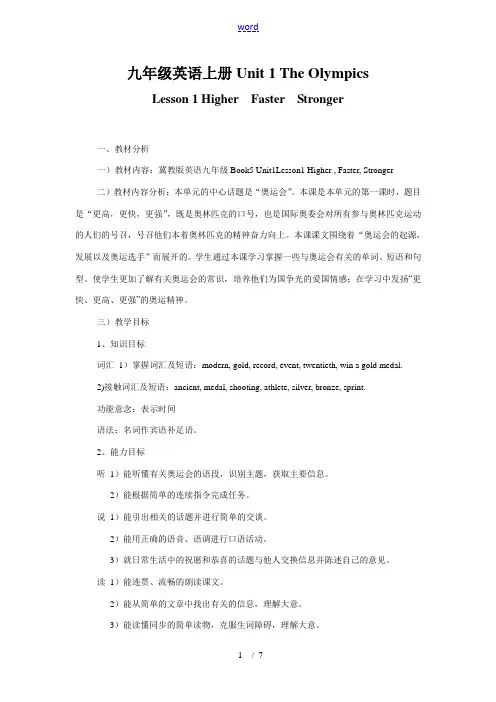
九年级英语上册Unit 1 The OlympicsLesson 1 Higher Faster Stronger一、教材分析一)教材内容:冀教版英语九年级Book5 Unit1Lesson1 Higher , Faster, Stronger二)教材内容分析:本单元的中心话题是“奥运会”。
本课是本单元的第一课时,题目是“更高,更快,更强”,既是奥林匹克的口号,也是国际奥委会对所有参与奥林匹克运动的人们的号召,号召他们本着奥林匹克的精神奋力向上。
本课课文围绕着“奥运会的起源,发展以及奥运选手”而展开的。
学生通过本课学习掌握一些与奥运会有关的单词、短语和句型。
使学生更加了解有关奥运会的常识,培养他们为国争光的爱国情感;在学习中发扬“更快、更高、更强”的奥运精神。
三)教学目标1、知识目标词汇1)掌握词汇及短语:modern, gold, record, event, twentieth, win a gold medal.2)接触词汇及短语:ancient, medal, shooting, athlete, silver, bronze, sprint.功能意念:表示时间语法:名词作宾语补足语。
2、能力目标听1)能听懂有关奥运会的语段,识别主题,获取主要信息。
2)能根据简单的连续指令完成任务。
说1)能引出相关的话题并进行简单的交谈。
2)能用正确的语音、语调进行口语活动。
3)就日常生活中的祝愿和恭喜的话题与他人交换信息并陈述自己的意见。
读1)能连贯、流畅的朗读课文。
2)能从简单的文章中找出有关的信息,理解大意。
3)能读懂同步的简单读物,克服生词障碍,理解大意。
4)能理解课文中事件发生的顺序和人物行为。
写1)能用词组和简单句写有关奥运会的短文。
2)能在老师的帮助下练习和修改有关奥运会的作文。
3、学习策略目标1)树立自主学习的概念和意识。
2)能总结所学语言材料中的语言规律并加以利用。
3)善于抓住用英语交际的机会。
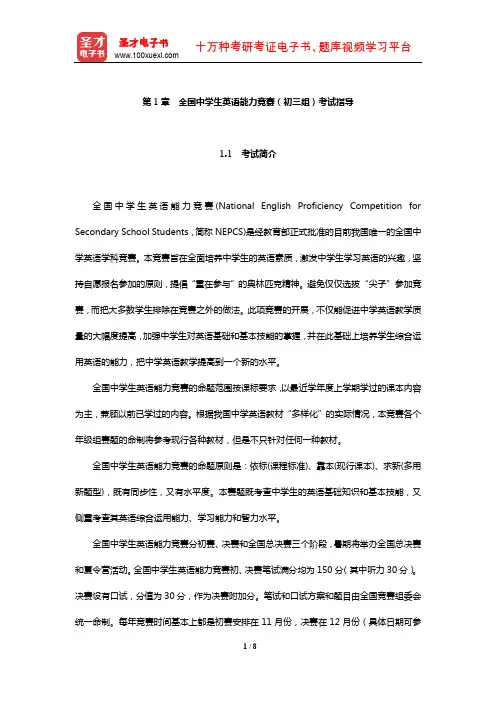
第1章全国中学生英语能力竞赛(初三组)考试指导1.1 考试简介全国中学生英语能力竞赛(National English Proficiency Competition for Secondary School Students,简称NEPCS)是经教育部正式批准的目前我国唯一的全国中学英语学科竞赛。
本竞赛旨在全面培养中学生的英语素质,激发中学生学习英语的兴趣,坚持自愿报名参加的原则,提倡“重在参与”的奥林匹克精神。
避免仅仅选拔“尖子”参加竞赛,而把大多数学生排除在竞赛之外的做法。
此项竞赛的开展,不仅能促进中学英语教学质量的大幅度提高,加强中学生对英语基础和基本技能的掌握,并在此基础上培养学生综合运用英语的能力,把中学英语教学提高到一个新的水平。
全国中学生英语能力竞赛的命题范围按课标要求,以最近学年度上学期学过的课本内容为主,兼顾以前已学过的内容。
根据我国中学英语教材“多样化”的实际情况,本竞赛各个年级组赛题的命制将参考现行各种教材,但是不只针对任何一种教材。
全国中学生英语能力竞赛的命题原则是:依标(课程标准)、靠本(现行课本)、求新(多用新题型),既有同步性,又有水平度。
本赛题既考查中学生的英语基础知识和基本技能,又侧重考查其英语综合运用能力、学习能力和智力水平。
全国中学生英语能力竞赛分初赛、决赛和全国总决赛三个阶段,暑期将举办全国总决赛和夏令营活动。
全国中学生英语能力竞赛初、决赛笔试满分均为150分(其中听力30分)。
决赛设有口试,分值为30分,作为决赛附加分。
笔试和口试方案和题目由全国竞赛组委会统一命制。
每年竞赛时间基本上都是初赛安排在11月份,决赛在12月份(具体日期可参见参赛学校的教务公告)。
1.2 试题分析一、试卷结构全国中学生英语能力竞赛(初三组)是全国中学生英语能力竞赛初一、初二、初三、高一、高二、高三六个年级组别之一。
根据近几年试题来看,虽然个别题型的出题形式会发生细微变化,但试卷结构大的题型框架不变,在保持题型相对稳定性和连续性的基础上,特别注重探索使用非选择性客观题型,加大语篇层次上的语言运用能力的考查。
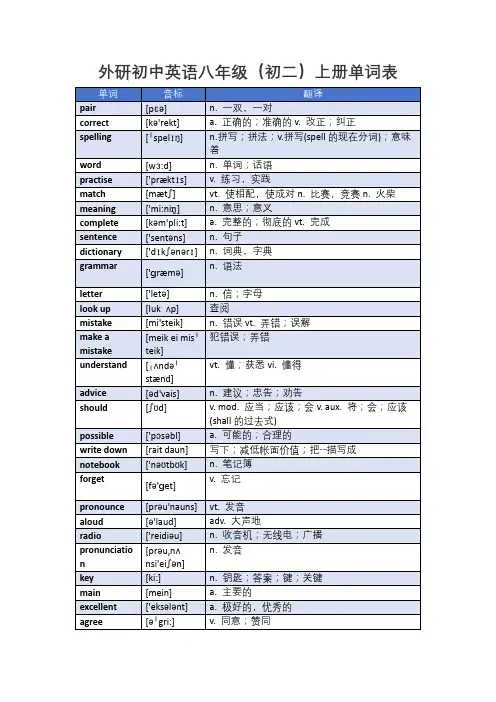

2021年英语奥林匹克竞赛七年级全国中学生英语能力竞赛NEPC一、赛事概述2021年英语奥林匹克竞赛七年级全国中学生英语能力竞赛NEPC,是一场针对全国七年级中学生的英语盛宴。
本次竞赛旨在激发学生学习英语的兴趣,提高他们的英语实际应用能力,为我国英语教育事业发展贡献力量。
在这场竞赛中,学生们将展示自己的英语才华,互相学习,共同进步。
二、参赛对象本次竞赛面向全国七年级中学生,不限地区、学校,只要你热爱英语,具备一定的英语基础,均可报名参加。
三、竞赛内容1. 听力:考察学生的英语听力理解能力,包括对话、短文理解和听写等环节。
2. 单项选择:涵盖词汇、语法、阅读理解等方面,检验学生的英语基础知识掌握程度。
3. 完形填空:通过一篇短文,让学生在理解文章大意的基础上,选择最合适的词语填空。
4. 阅读理解:包括多篇文章,涉及故事、科普、人物传记等题材,考察学生的阅读速度和深度理解能力。
四、竞赛流程1. 报名:参赛学生需在规定时间内完成报名,提交个人信息及参赛承诺书。
2. 初赛:参赛学生在规定时间内完成线上或线下答题,选拔出优秀选手进入复赛。
3. 复赛:复赛分为地区赛和全国赛两个阶段,地区赛选拔出各地区顶尖选手,全国赛角逐出全国一等奖、二等奖、三等奖。
4. 颁奖:颁奖典礼将于竞赛结束后举行,届时将公布获奖名单,并为获奖选手颁发证书和奖品。
五、参赛意义1. 提升英语能力:通过参加竞赛,学生可以在实践中提高自己的英语听说读写能力。
2. 增强自信心:在竞赛中取得优异成绩,有助于学生树立自信心,激发学习英语的热情。
3. 拓展视野:竞赛内容丰富多样,有助于学生拓宽知识面,了解世界文化。
4. 结识良师益友:在竞赛过程中,学生可以结识志同道合的朋友,互相学习,共同进步。
六、赛事特色1. 权威性:本次竞赛由我国英语教育界权威机构主办,评委团由资深英语教育专家、外籍教师组成,确保赛事的公正性和专业性。
2. 公平竞争:竞赛采用统一试卷、统一评分标准,确保每位参赛选手在公平的环境下展示自己的实力。
2024年初中英语中考单词巧记汇总(第15组)1.Sliver n. 银,银器;adj.银色的A sliver of light showed under the door.门底下现出一丝亮光。
2. Spare adj. 空闲的;不用的He could have taken a spare key.他原本可以带上一把备用钥匙的。
3.Steal v. (stole ; stolen) 偷;窃取Hunger drove her to steal.饥饿迫使她去偷窃。
4.Style n.样式; 款式He had a dense, ponderous style.他的风格是词藻堆砌、冗长沉闷。
5.Suppose v. 推断;料想Let's suppose X knows what Y is doing.假设X知道Y正在干什么。
6.Surface n. 表面;表层He staggered on the uneven surface.他摇摇晃晃地走在高低不平的表面上。
7.Survey n.调查The survey has a margin of error of 2.5%.测量的误差幅度为2.5%。
8.Switzerland 瑞士Switzerland is pletely landlocked.瑞士完全是个内陆国。
9.take action 采取行动We need more time to see how things develop before we take action. 我们采取行动以前需要有更多时间观察情况的发展。
10.take part in 参加I was quite sulky, so I didn't take part in much.我相当闷闷不乐,所以没有怎么参与。
11.take place 发生;出现Where will the 2022 Winter Olympics take place?2022年冬奥会将在哪里举行?12.take pride in 为⋯⋯感到自豪I take pride in Dazhou.我以达州为荣。
沪教版牛津英语初中英语九年级上册(英语单词表,带发音)Unit 1golden英音 [ˈɡəʊldən]美音 [ˈɡoʊldən]adj. 金色的,黄金般的;珍贵的;金制的crown英音 [kraʊn]美音 [kraʊn]n. 王冠;花冠;王权;顶点 vt. 加冕;居…之顶;表彰;使圆满完成Olympics英音 [əˈlɪmpɪks]美音 [oˈlɪmpɪks]n. 奥林匹克运动会agreement英音 [əˈɡriːmənt]美音 [əˈɡriːmənt]n. 协议;同意,一致confirmation英音 [ˌkɒnfəˈmeɪʃ(ə)n]美音 [ˌkɑːnfərˈmeɪʃn]n. 确认;证实;证明;批准pot英音 [pɒt]美音 [pɑːt]n. 壶;盆;罐 vt. 把…装罐;射击;节略 vi. 随手射击doubt英音 [daʊt]美音 [daʊt]n. 怀疑;疑问;疑惑 v. 怀疑;不信;恐怕;拿不准real英音 [ˈriːəl; rɪəl]美音 [ˈriːəl]n. 现实;实数 adj. 实际的;真实的;实在的adv. 真正地;确实地truth英音 [truːθ]美音 [truːθ]n. 真理;事实;诚实;实质seem英音 [siːm]美音 [siːm]vi. 似乎;像是;装作solve英音 [sɒlv]美音 [sɑːlv]vt. 解决;解答;溶解 vi. 作解答fill英音 [fɪl]美音 [fɪl]n. 满足;填满的量;装填物 vt. 装满,使充满;满足;堵塞;任职 vi. 被充满,膨胀bowl英音 [bəʊl]n. 碗;木球;大酒杯 vt. 投球;旋转;平稳快美音 [boʊl]速移动vi玩保龄球;滑动;平稳快速移动displace英音 [dɪsˈpleɪs]美音 [dɪsˈpleɪs]vt. 取代;置换;转移;把…免职;排水less 英音 [les]美音 [les]adv. 较少地;较小地;更小地 adj. 较少的;较小的 prep. 减去 n. 较少;较小metal英音 [ˈmetl]美音 [ˈmetl]n. 金属;合金 vt. 以金属覆盖 adj. 金属制的certain英音 [ˈsɜːt(ə)n]美音 [ˈsɜːrtn]adj. 某一;必然的;确信;无疑的;有把握的pron. 某些;某几个prison英音 [ˈprɪz(ə)n]美音 [ˈprɪzn]n. 监狱;监禁;拘留所 vt. 监禁,关押boxing英音 [ˈbɒksɪŋ]美音 [ˈbɑːksɪŋ]n. 拳击;装箱;围模;做箱的材料 v. 将…装入盒中(box的ing形式)racing英音 [ˈreɪsɪŋ]美音 [ˈreɪsɪŋ]n. 赛马;竞赛 adj. 比赛的 vi. 赛马(race的ing形式);竞赛wrestling英音 [ˈreslɪŋ]美音 [ˈreslɪŋ]n. 摔跤;扭斗 v. 摔跤;格斗(wrestle的ing形式);与…摔跤;使劲移动hit英音 [hɪt]美音 [hɪt]n. 打;打击;(演出等)成功;讽刺 vt. 打击;袭击;碰撞;偶然发现;伤…的感情 vi.…brave英音 [breɪv]美音 [breɪv]n. 勇士 adj. 勇敢的;华丽的 vt. 勇敢地面对punctuation英音 [ˌpʌŋktʃuˈeɪʃn]美音 [ˌpʌŋktʃuˈeɪʃn]n. 标点;标点符号correct英音 [kəˈrekt]美音 [kəˈrekt]adj. 正确的;恰当的;端正的 vt. 改正;告诫vi. 调整;纠正错误mistake英音 [mɪˈsteɪk]美音 [mɪˈsteɪk]n. 错误;误会;过失 vt. 弄错;误解 vi. 弄错;误解happy with乐意Unit 3be happy with 对……感到满意;对…满意;高兴fill ... with ...v. 充满run over v. 轧过;碾过;演练;排练send ... to prison 无make sure英音 [me ɪk ʃʊə(r)]美音 [me ɪk ʃʊr]na. 尽力做到;深信;务必;务请mind英音 [ma ɪnd]美音 [ma ɪnd]n. 理智,精神;意见;智力;记忆力 vt. 介意;专心于;照料 vi. 介意;注意meal 英音 [mi ːl]美音 [mi ːl]n. 一餐,一顿饭;膳食 vi. 进餐share英音 [ʃe ə(r)]美音 [ʃer]n. 份额;股份 vt. 分享,分担;分配 vi. 共享;分担decision英音 [d ɪˈs ɪʒ(ə)n]美音 [d ɪˈs ɪʒn]n. 决定,决心;决议possessions英音 [p ə'ze ʃənz]美音 [p əˈze ʃnz]n. [经] 财产;所有物(possession的复数形式)expect英音 [ɪk ˈspekt]美音 [ɪk ˈspekt]vi. 期待;预期 vt. 期望;指望;认为;预料abroad英音 [əˈbr ɔːd]美音 [əˈbr ɔːd]n. 海外;异国 adj. 往国外的 adv. 在国外;到海外business英音 [ˈb ɪzn əs]美音 [ˈb ɪzn əs]n. 商业;[贸易] 生意;[贸易] 交易;事情personal英音 [ˈp ɜːs ən(ə)l]美音 [ˈp ɜːrs ənl]n. 人事消息栏;人称代名词 adj. 个人的;身体的;亲自的daughter英音 [ˈd ɔːt ə(r)]美音 [ˈd ɔːt ər]n. 女儿;[遗][农学] 子代 adj. 女儿的;子代的mindn. 理智,精神;意见;智力;记忆力 vt. 介英音 [maɪnd]美音 [maɪnd]意;专心于;照料 vi. 介意;注意fashionable英音 [ˈfæʃnəbl]美音 [ˈfæʃnəbl]adj. 流行的;时髦的;上流社会的fashion英音 [ˈfæʃ(ə)n]美音 [ˈfæʃn]n. 时尚;时装;样式;时髦人物 vt. 使用;改变;做成…的形状out of date英音 [ˌaʊt əv ˈdeɪt]美音 [ˌaʊt əv ˈdeɪt]adj. 过时的;缺乏新信息的;陈腐的;失效的iron英音 [ˈaɪən]美音 [ˈaɪərn]n. 熨斗;烙铁;坚强 adj. 铁的;残酷的;刚强的 vt. 熨;用铁铸成 vi. 熨衣;烫平event英音 [ɪˈvent]美音 [ɪˈvent]n. 事件,大事;项目;结果suppose英音 [səˈpəʊz]美音 [səˈpoʊz]conj. 假使…结果会怎样 vt. 假设;认为;让(虚拟语气);推想 vi. 猜想;料想either英音 [ˈaɪðə(r)]美音 [ˈiːðər]conj. 也(用于否定句或否定词组后);根本prep. 任何一个 adj. 两者之中任一的;两者…relationship英音 [rɪˈleɪʃnʃɪp]美音 [rɪˈleɪʃnʃɪp]n. 关系;关联invite英音 [ɪnˈvaɪt]美音 [ɪnˈvaɪt]n. 邀请 vt. 邀请,招待;招致cost英音 [kɒst]美音 [kɔːst]n. 费用,代价,成本;损失 vt. 花费;使付出;使花许多钱 vi. 花费type英音 [taɪp]美音 [taɪp]n. 类型,品种;模范;样式 vt. 打字;测定(血等)类型 vi. 打字help with v. 帮助on business na. 因公be on business无have no对…不[不太]感兴趣Unit 2interest inastronomer英音 [əˈstrɒnəmə(r)]美音 [əˈstrɑːnəmər]n. 天文学家genius英音 [ˈdʒiːniəs]美音 [ˈdʒiːniəs]n. 天才,天赋;精神consider英音 [kənˈsɪdə(r)]美音 [kənˈsɪdər]vi. 考虑;认为;细想 vt. 考虑;认为;考虑到;细想sense 英音 [sens]美音 [sens]n. 感觉,功能;观念;道理;理智 vt. 感觉到;检测humour英音 [ˈhjuːmə(r)]美音 [ˈhjuːmər]n. 幽默(等于humor);诙谐 vt. 迁就;使满足invitation英音 [ˌɪnvɪˈteɪʃn]美音 [ˌɪnvɪˈteɪʃn]n. 邀请;引诱;请帖;邀请函theory英音 [ˈθɪəri]美音 [ˈθiːəri]n. 理论;原理;学说;推测university英音 [ˌjuːnɪˈvɜːsəti]美音 [ˌjuːnɪˈvɜːrsəti]n. 大学;综合性大学;大学校舍pleasure英音 [ˈpleʒə(r)]美音 [ˈpleʒər]n. 快乐;希望;娱乐;令人高兴的事 vt. 使高兴;使满意 vi. 高兴;寻欢作乐avoid英音 [əˈvɔɪd]美音 [əˈvɔɪd]vt. 避免;避开,躲避;消除lecture英音 [ˈlektʃə(r)]美音 [ˈlektʃər]n. 演讲;讲稿;教训 vt. 演讲;训诫 vi. 讲课;讲演tonight英音 [təˈnaɪt]美音 [təˈnaɪt]n. 今晚 adv. 在今晚audience英音 [ˈɔːdiəns]美音 [ˈɔːdiəns]n. 观众;听众;读者;接见;正式会见;拜会trust英音 [trʌst]美音 [trʌst]n. 信任,信赖;责任;托拉斯 vt. 信任,信赖;盼望;赊卖给 vi. 信任,信赖;依靠applause英音 [əˈplɔːz]美音 [əˈplɔːz]n. 欢呼,喝采;鼓掌欢迎pale英音 [peɪl]美音 [peɪl]n. 前哨;栅栏;范围 adj. 苍白的;无力的;暗淡的 vt. 使失色;使变苍白;用栅栏围 vi. …achievement英音 [əˈtʃiːvmənt]美音 [əˈtʃiːvmənt]n. 成就;完成;达到;成绩universe英音 [ˈjuːnɪvɜːs]美音 [ˈjuːnɪvɜːrs]n. 宇宙;世界;领域philosopher英音 [fəˈlɒsəfə(r)]美音 [fəˈlɑːsəfər]n. 哲学家;哲人obey英音 [əˈbeɪ]美音 [əˈbeɪ]vt. 服从,听从;按照……行动 vi. 服从,顺从;听话reduce英音 [rɪˈdjuːs]美音 [rɪˈduːs]vi. 减少;缩小;归纳为 vt. 减少;降低;使处于;把…分解exactly英音 [ɪɡˈzæktli]美音 [ɪɡˈzæktli]adv. 恰好地;正是;精确地;正确地action英音 [ˈækʃ(ə)n]美音 [ˈækʃ(ə)n]n. 行动;活动;功能;战斗;情节sense ofhumour幽默感;有幽默感;幽默之作let ... down na. 使失望;放下;丢面子by heart牢记;凭记忆;熟记take a seat na. 坐下withoutdifficultyna. 容容易易就…join in na. 参加;参与un. 心中有数;对…一无所知;感到茫无头Unit 6have no idea 心中有数;对无所知;感到茫无头绪;不想in trouble na. 为难;被捕;未婚怀孕be in trouble un. 自讨苦吃;出事play a joke on sb.v. 取笑turning point n. 转折点;转捩点;转机a series ofna. 一系列;许多seat英音 [si ːt]美音 [si ːt]n. 座位;所在地;职位 vt. 使…坐下;可容纳…的;使就职preference英音 [ˈprefr əns]美音 [ˈprefr əns]n. 偏爱,倾向;优先权review英音 [r ɪˈvju ː]美音 [r ɪˈvju ː]n. 回顾;复习;评论;检讨;检阅 vt. 回顾;检查;复审 vi. 回顾;复习功课;写评论bean 英音 [bi ːn]美音 [bi ːn]n. 豆;嘴峰;毫无价值的东西 vt. 击…的头部beef英音 [bi ːf]美音 [bi ːf]n. 牛肉;肌肉;食用牛;牢骚 vt. 养;加强 vi.抱怨,告发;发牢骚product英音 [ˈpr ɒd ʌkt]美音 [ˈprɑːd ʌkt]n. 产品;结果;[数] 乘积;作品protein英音 [ˈpr əʊti ːn]美音 [ˈpro ʊti ːn]n. 蛋白质;朊 adj. 蛋白质的hamburger英音 [ˈhæmb ɜːɡə(r)]美音 [ˈhæmb ɜːrɡər]n. 汉堡包,火腿汉堡;牛肉饼,肉饼;碎牛肉cola英音 [ˈk əʊl ə]美音 [ˈko ʊl ə]n. 可乐;可乐树(其子含咖啡碱)sandwich英音 [ˈsænw ɪt ʃ; ˈsænw ɪd ʒ]美音 [ˈsænw ɪt ʃ; ˈsænw ɪd ʒ]n. 三明治;夹心面包 vt. 夹入;挤进;把...做成三明治salad 英音 [ˈsæl əd]美音 [ˈsæl əd]n. 色拉;尤指莴苣medical 英音 [ˈmed ɪkl]美音 [ˈmed ɪkl]adj. 医学的;药的;内科的 n. 医生;体格检查fat 英音 [fæt]美音 [fæt]n. 脂肪,肥肉 adj. 肥的,胖的;油腻的;丰满的 vt. 养肥;在…中加入脂肪 vi. 长肥sugar 英音 [ˈʃʊɡə(r)]美音 [ˈʃʊɡər]n. 糖;食糖;甜言蜜语 vt. 加糖于;粉饰 vi.形成糖state 英音 [ste ɪt]美音 [ste ɪt]n. 国家;州;情形 adj. 国家的;州的;正式的 vt. 规定;声明;陈述necessary 英音 [ˈnes əs əri]美音 [ˈnes əseri]adj. 必要的;必需的;必然的 n. 必需品research 英音 [r ɪˈs ɜːt ʃ; ˈri ːs ɜːt ʃ]美音 [ˈri ːs ɜːrt ʃ; r ɪˈs ɜːrt ʃ; r ɪˈs ərt ʃ; ˈri ːs ərt ʃ]n. 研究;调查 vt. 研究;调查 vi. 研究;调查 [ 过去式 researched 过去分词…plenty英音 [ˈplenti]美音 [ˈplenti]n. 丰富,大量;充足 adj. 足够的,很多的adv. 足够usual英音 [ˈju ːʒu əl]美音 [ˈju ːʒu əl; ˈju ːʒəl]adj. 通常的,惯例的;平常的coffee英音 [ˈk ɒfi]美音 [ˈk ɔːfi]n. 咖啡;咖啡豆;咖啡色treat英音 [tri ːt]美音 [tri ːt]n. 请客;款待 vi. 探讨;请客;协商 vt. 治疗;对待;探讨;视为customer英音 [ˈk ʌst əm ə(r)]美音 [ˈk ʌst əm ər]n. 顾客;家伙title英音 [ˈta ɪt(ə)l]美音 [ˈta ɪtl]n. 冠军;标题;头衔;权利;字幕 adj. 冠军的;标题的;头衔的 vt. 加标题于;赋予头…serve英音 [s ɜːv]美音 [s ɜːrv]n. 发球,轮到发球 vi. 服役,服务;适合,足够;发球;招待,侍候 vt. 招待,供应;为……pound英音 [pa ʊnd]n. 英镑;重击,重击声;兽栏;拘留所 vt. 捣Unit 8美音 [paʊnd]烂;敲打;监禁拘留vi连续重击猛击pie英音 [paɪ]美音 [paɪ]n. 馅饼;饼图;爱说话的人 vt. 使杂乱chip英音 [tʃɪp]美音 [tʃɪp]n. [电子] 芯片;筹码;碎片;(食物的) 小片;薄片 vt. 削,凿;削成碎片 vi. 剥落;碎裂service英音 [ˈsɜːvɪs]美音 [ˈsɜːrvɪs]n. 服务,服侍;服役;仪式 adj. 服务性的;耐用的;服现役的 vt. 维修,检修;保养seat英音 [siːt]美音 [siːt]n. 座位;所在地;职位 vt. 使…坐下;可容纳…的;使就职a balanced diet un. 均衡饮食dairy product un. 乳制品stay away from un. 退避三舍;回避;不要到…去;停止和…交往fried food un. 油炸食物soft drink n. 软饮料(不含酒精)medicalexaminationun. 医学检查lose weight un. 体重减轻plenty of na. 很多的in general na. 一般;大体上treat oneself tosth.舍得(吃、穿等)prepared to dosth.愿意做be prepared todo sth.na. 准备着set 英音 [set]美音 [set]n. [数] 集合;一套;布景;[机] 装置 adj. 固定的;规定的;固执的 vi. (日,月)落沉;凝固;…gift英音 [ɡɪft]美音 [ɡɪft]n. 礼物;天赋;赠品 vt. 赋予;向…赠送graduation英音 [ˌɡrædʒuˈeɪʃ(ə)n]美音 [ˌɡrædʒuˈeɪʃn]n. 毕业;毕业典礼;刻度,分度;分等级cent 英音 [sent]美音 [sent]n. 分;一分的硬币;森特(等于半音程的百分之一)count英音 [kaʊnt]美音 [kaʊnt]n. 计数;计算;伯爵 vt. 计算;认为 vi. 计数;有价值afford英音 [əˈfɔːd]美音 [əˈfɔːrd]vt. 给予,提供;买得起present英音 [ˈprez(ə)nt]美音 [ˈpreznt]n. 现在;礼物;瞄准 adj. 现在的;出席的 vt.提出;介绍;呈现;赠送 vi. 举枪瞄准knee英音 [niː]美音 [niː]n. 膝盖,膝 vt. 用膝盖碰sign英音 [saɪn]美音 [saɪn]n. 迹象;符号;记号;手势;指示牌 vt. 签署;示意 vi. 签署;签名goods英音 [ɡʊdz]美音 [ɡʊdz]n. 商品;动产;合意的人;真本领search英音 [sɜːtʃ]美音 [sɜːrtʃ]n. 搜寻;探究,查究 vt. 搜索;搜寻;调查;搜查;探求 vi. 搜寻;调查;探求chain英音 [tʃeɪn]美音 [tʃeɪn]n. 链;束缚;枷锁 vt. 束缚;囚禁;用铁链锁住bill英音 [bɪl]美音 [bɪl]n. [法] 法案;广告;账单;[金融] 票据;钞票;清单 vt. 宣布;开账单;用海报宣传step 英音 [step]美音 [step]n. 步,脚步;步骤;步伐;梯级 vt. 走,迈步vi. 踏,踩;走draw英音 [drɔː]美音 [drɔː]n. 平局;抽签 vi. 拉;拖 vt. 画;拉;吸引set 英音 [set]美音 [set]n. [数] 集合;一套;布景;[机] 装置 adj. 固定的;规定的;固执的 vi. (日,月)落沉;凝固;…comb英音 [kəʊm]n. 梳子;蜂巢;鸡冠 vt. 梳头发;梳毛 vi.(浪)涌起Unit 4美音 [koʊm](浪)涌起accuse英音 [əˈkjuːz]美音 [əˈkjuːz]vt. 控告,指控;谴责;归咎于 vi. 指责;控告America英音 [əˈmerɪkə]美音 [əˈmerɪkə]n. 美洲(包括北美和南美洲);美国wife英音 [waɪf]美音 [waɪf]n. 妻子,已婚妇女;夫人album英音 [ˈælbəm]美音 [ˈælbəm]n. 相簿;唱片集;集邮簿;签名纪念册note英音 [nəʊt]美音 [noʊt]n. 笔记;音符;票据;注解;纸币;便笺;照会;调子 vt. 注意;记录;注解look for英音 [ˈlʊk fɔː(r)]美音 [ˈlʊk fɔːr]v. 寻找;探索;渴望;盼望at last na. 终于fix ... on把…固定住; 把…集中在…上; 确定; 选定hold out na. 伸出;提出;维持;制止accused of ...被指控犯有……罪;被控犯有…罪;被控告犯有…罪be accused of...被指控;被指责,谴责;被控诉,控告under thename ...用……名字under thename of ...na. = nameless.;名字说不出来online英音 [ˌɒnˈlaɪn]美音 [ˌɑːnˈlaɪn]adj. 联机的;在线的 adv. 在线地model英音 [ˈmɒd(ə)l]n. 模型;典型;模范;模特儿;样式 vt. 模美音 [ˈmɑːdl]拟;塑造;模仿vi做模型;做模特儿adjdiet英音 [ˈdaɪət]美音 [ˈdaɪət]n. 饮食;食物;规定饮食 vt. [医] 照规定饮食vi. 节食though英音 [ðəʊ]美音 [ðoʊ]conj. 虽然;尽管 prep. 但 adv. 可是,虽然;不过;然而awful英音 [ˈɔːf(ə)l]美音 [ˈɔːf(ə)l]adj. 可怕的;极坏的;使人敬畏的regret英音 [rɪˈɡret]美音 [rɪˈɡret]n. 遗憾;抱歉;悲叹 vi. 感到后悔;感到抱歉vt. 后悔;惋惜;哀悼ashamed英音 [əˈʃeɪmd]美音 [əˈʃeɪmd]adj. 惭愧的,感到难为情的;耻于……的situation英音 [ˌsɪtʃuˈeɪʃ(ə)n]美音 [ˌsɪtʃuˈeɪʃn]n. 情况;形势;处境;位置braces英音 [ˈbreɪsɪz]美音 [ˈbreɪsɪz]n. 背带;吊带(brace的复数)hate英音 [heɪt]美音 [heɪt]n. 憎恨;反感 vt. 憎恨;厌恶;遗憾 vi. 仇恨advantage英音 [ədˈvɑːntɪdʒ]美音 [ədˈvæntɪdʒ]n. 优势;利益;有利条件 vt. 有利于;使处于优势 vi. 获利embarrassed英音 [ɪmˈbærəst]美音 [ɪmˈbærəst]v. 使...困窘;使...局促不安(embarrass的过去分词形式) adj. 尴尬的;窘迫的suggest英音 [səˈdʒest]美音 [səˈdʒestˌsəɡˈdʒest]vt. 提议,建议;启发;使人想起;显示;暗示mad 英音 [mæd]美音 [mæd]adj. 疯狂的;发疯的;愚蠢的;着迷的 n. 狂怒mess 英音 [mes]美音 [mes]n. 混乱;食堂,伙食团;困境;脏乱的东西vt. 弄乱,弄脏;毁坏;使就餐 vi. 把事情弄…annoying英音 [əˈnɔɪɪŋ]v. 骚扰(annoy的ing形式) adj. 讨厌的;恼人的美音 [əˈnɔɪɪŋ]fail英音 [feɪl]美音 [feɪl]n. 不及格 vi. 失败,不及格;破产;缺乏;衰退 vt. 不及格;使失望;忘记;舍弃careless英音 [ˈkeələs]美音 [ˈkerləs]adj. 粗心的;无忧无虑的;淡漠的comment英音 [ˈkɒment]美音 [ˈkɑːment]n. 评论;意见;批评 vi. 发表评论;发表意见vt. 为…作评语request英音 [rɪˈkwest]美音 [rɪˈkwest]n. 请求;需要 vt. 要求,请求polite英音 [pəˈlaɪt]美音 [pəˈlaɪt]adj. 有礼貌的,客气的;文雅的;上流的;优雅的none英音 [nʌn]美音 [nʌn]pron. 没有人;一个也没有;没有任何东西adj. 没有的,一点没有的 adv. 决不,一点也…exam英音 [ɪɡˈzæm]美音 [ɪɡˈzæm]n. 考试;测验on a diet adj. 在节食be on a diet节食;节食减肥;正在节食laugh at na. 嘲笑;付之一笑;因…而发笑feel at v. 用手摸着feel ashamedof对…感到惭愧;感到羞愧;对……感到羞愧drive sb. mad un. 变疯make a mess弄乱;搞成一团糟;搞得乱七八糟out of place na. 不得其所的;不适当的;不相称的;碍事的none of one'sbusiness无hear from na. 得到…的消息Unit 5praise英音 [preɪz]美音 [preɪz]n. 赞扬;称赞;荣耀;崇拜 vt. 赞美,歌颂;表扬 vi. 赞美;赞扬view英音 [vjuː]美音 [vjuː]n. 观察;视野;意见;风景 vt. 观察;考虑;查看script英音 [skrɪpt]美音 [skrɪpt]n. 脚本;手迹;书写用的字母 vt. 把…改编为剧本 vi. 写电影脚本director英音 [dəˈrektə(r); daɪˈrektə(r)]美音 [dəˈrektər]n. 主任,主管;导演;人事助理make-up英音 [ˈmeɪk ʌp]美音 [ˈmeɪk ʌp]n. 化妆品;(美)补考;性格;构造;排版artist英音 [ˈɑːtɪst]美音 [ˈɑːrtɪst]n. 艺术家;美术家(尤指画家);大师studio英音 [ˈstjuːdiəʊ]美音 [ˈstuːdioʊ]n. 工作室;[广播][电视] 演播室;画室;电影制片厂contestant英音 [kənˈtestənt]美音 [kənˈtestənt]n. 竞争者;争辩者upon英音 [əˈpɒn]美音 [əˈpɑːn]prep. 根据;接近;在…之上among英音 [əˈmʌŋ]美音 [əˈmʌŋ]prep. 在…中间;在…之中onto英音 [ˈɒntə; ˈɒntu]美音 [ˈɑːntə]prep. 在…之上;对…了解;映射到…上 adj.映射的;自身的;映成的forward英音 [ˈfɔːwəd]美音 [ˈfɔːrwərd]n. 前锋 adj. 向前的;早的;迅速的 adv. 向前地;向将来 vt. 促进;转寄;运送second英音 [ˈsekənd]美音 [ˈsekənd; sɪˈkɑːnd]num. 第二 n. 秒;第二名;瞬间;二等品 adj.第二的;次要的;附加的 vt. 支持 adv. 第二…relaxed英音 [rɪˈlækst]美音 [rɪˈlækst]v. relax的过去式和过去分词 adj. 松懈的,放松的;悠闲的,自在的;不严格的,不拘束的Unit 7ahead of 英音 [əˈhed əv]美音 [əˈhed əv]prep. (时间、空间)在…前面;早于;领先beat 英音 [bi ːt]美音 [bi ːt]n. 拍子;敲击;有规律的一连串敲打 adj. 筋疲力尽的;疲惫不堪的 vt. 打;打败 vi. 打;…still 英音 [st ɪl]美音 [st ɪl]conj. 仍然;但是;尽管如此 n. 寂静;剧照;蒸馏室 adj. 静止的,不动的;寂静的,平静…single 英音 [ˈs ɪŋɡ(ə)l]美音 [ˈs ɪŋɡl]n. 一个;单打;单程票 adj. 单一的;单身的;单程的 vt. 选出 vi. 击出一垒安打victory 英音 [ˈv ɪkt əri]美音 [ˈv ɪkt əri]n. 胜利;成功;克服England 英音 [ˈɪŋɡl ənd]美音 [ˈɪŋɡl ənd]n. 英格兰lucky 英音 [ˈl ʌki]美音 [ˈl ʌki]adj. 幸运的;侥幸的news 英音 [nju ːz]美音 [nu ːz]n. 新闻,消息;新闻报导floor plan n. 楼层平面图talent show n. 业余歌手演唱会; 选秀节目,选秀比赛pass out v. 昏倒;分发;主要用于英式英语keep still un. 置之不理;不要动;默不作声;忍在肚里emergency exit na. 太平门on weekdays在工作日;在平日;在周日survey英音 [ˈs ɜːve ɪ]美音 [ˈs ɜːrve ɪ]n. 调查;测量;审视;纵览 vt. 调查;勘测;俯瞰 vi. 测量土地adventure英音 [əd ˈvent ʃə(r)]美音 [əd ˈvent ʃər]n. 冒险;冒险精神;投机活动 vt. 冒险;大胆说出 vi. 冒险novel英音 [ˈnɒv(ə)l]美音 [ˈnɑːvl]adj. 新奇的;异常的 n. 小说frog英音 [frɒɡ]美音 [frɑːɡ]n. 青蛙;[铁路] 辙叉;饰扣 vi. 捕蛙congratulations英音 [kənˌgrætjʊˈleɪʃənz]美音 [kənˌɡrætʃəˈleɪʃənz]n. 祝贺;恭喜;贺词(congratulation的复数形式)sympathy英音 [ˈsɪmpəθi]美音 [ˈsɪmpəθi]n. 同情;慰问;赞同steamboat英音 [ˈstiːmbəʊt]美音 [ˈstiːmboʊt]n. 汽船,轮船steam英音 [stiːm]美音 [stiːm]n. 蒸汽;精力 adj. 蒸汽的 vt. 蒸,散发;用蒸汽处理 vi. 蒸,冒水汽writer英音 [ˈraɪtə(r)]美音 [ˈraɪtər]n. 作家;作者humorous英音 [ˈhjuːmərəs]美音 [ˈhjuːmərəs]adj. 诙谐的,幽默的;滑稽的,可笑的fence 英音 [fens]美音 [fens]n. 栅栏;围墙;剑术 vt. 防护;用篱笆围住;练习剑术 vi. 击剑;搪塞;围以栅栏;跳过栅…task英音 [tɑːsk]美音 [tæsk]n. 工作,作业;任务 vt. 分派任务yard英音 [jɑːd]美音 [jɑːrd]n. 院子;码(英制中丈量长度单位,1码=3英尺);庭院;帆桁 vt. 把…关进或围在畜栏里board英音 [bɔːd]美音 [bɔːrd]n. 董事会;木板;甲板;膳食 vt. 上(飞机、车、船等);用板盖上;给提供膳宿 vi. 寄宿survey英音 [ˈsɜːveɪ]美音 [ˈsɜːrveɪ]n. 调查;测量;审视;纵览 vt. 调查;勘测;俯瞰 vi. 测量土地progress英音 [ˈprəʊɡres]美音 [ˈprɑːɡres; ˈprɑːɡrəs]n. 进步,发展;前进 vi. 前进,进步;进行n. 休息,静止;休息时间;剩余部分;支架rest 英音 [rest]美音 [rest]vt. 使休息,使轻松;把…寄托于 vi. 休息;…pity英音 [ˈpɪti]美音 [ˈpɪti]n. 怜悯,同情;遗憾 vt. 对……表示怜悯;对……感到同情silence英音 [ˈsaɪləns]美音 [ˈsaɪləns]n. 沉默;寂静;缄默;不谈;无声状态 vt. 使沉默;使安静;压制;消除噪音 int. 安静!…while英音 [waɪl]美音 [waɪl]conj. 虽然;然而;当……的时候 n. 一会儿;一段时间 vt. 消磨;轻松地度过careful英音 [ˈkeəf(ə)l]美音 [ˈkerfl]adj. 仔细的,小心的deal英音 [diːl]美音 [diːl]n. 交易;(美)政策;待遇;份量 vi. 处理;讨论;对待;做生意 vt. 处理;给予;分配…coat英音 [kəʊt]美音 [koʊt]n. 外套 vt. 覆盖…的表面celebrated英音 [ˈselɪbreɪtɪd]美音 [ˈselɪbreɪtɪd]v. 庆祝(celebrate的过去式和过去分词) adj.著名的;有名望的lead英音 [liːd]美音 [liːd; led]n. 领导;铅;导线;榜样 vt. 领导;致使;引导;指挥 vi. 领导;导致;用水砣测深 adj. …plot英音 [plɒt]美音 [plɑːt]n. 情节;图;阴谋 vt. 密谋;绘图;划分;标绘 vi. 密谋;策划;绘制lazy英音 [ˈleɪzi]美音 [ˈleɪzi]adj. 懒惰的;懒洋洋的;怠惰的;慢吞吞的pretend英音 [prɪˈtend]美音 [prɪˈtend]vt. 假装,伪装,模拟 adj. 假装的 vi. 假装,伪装,佯装have a rest英音 [hæv ə rest]美音 [hæv ərest]v. 休息一下think of na. 想起come along na. 进步;同意;一道来;请过来what a pity un. 真可惜go on doing继续做;继续做原来做的事;继续做同一件事in silence na. 沉默着after a while na. 过了一会儿turn sth. over na. £ 500 a week 每星期卖得五百镑trick sb. into无doing sth.。
一. 听力部分听下面两段对话,从每题所给的A、B、C三个选项中选出可以回答问题的最佳答案。
每段对话读两遍。
听第一段对话,回答1-3小题。
1. How many times has Linda been to Beijing before? A. She has been to Beijing many times. B. She has never been to Beijing. C. She has been to Beijing only once. 2. What is Linda probably doing now? A. She is visiting the Great Wall.B. She is traveling in the country.C. She is listening to the weather report.3. What season is it in Beijing when Linda stays here?A. Summer.B. Autumn.C. Winter.听第二段对话,回答4-5小题。
4. Where were the man and the woman?A. They were in the street.B. They were at a hotel.C. They were on a train.5. What can we learn from the conversation?A. The man is quite rude.B. The woman is a thief.C. They are helping each other.二. 词汇A. 根据句意补全单词。
(首字母已给出)1. -How long have you been skating?-I’ve been skating s____________I was five years old.2. Would you m__________getting out of the bathroom?3. The waitress b_____you the wrong food.4. Why don’t you give a n_______for you mom?5. She is going to make a s___________meal.B. 选出一个与句中划线部分意思相同或相近的词语1. I got mad when I lost my book.A. right awayB. for a long timeC. got angryD. got sad2. I’ll get up at once.A. right awayB. for a long timeC. a moment agoD. a few minutes later3. Mike usually watches TV in the middle of the day.A. in the noonB. at noonC. in the afternoonD. at night4. How about writing it in English?A. Why don’t youB. Why notC. Would you likeD. What about5. My friend enjoys watching TV.A. likeB. loves toC. likesD. likes to三. 单项选择1. There is nobody in the room, _____________?A.is thereB. isn’t thereC. is itD. isn’t it2. -_______you ever________to Beijing?-No, I haven’t.A. Do, beenB. Have, beenC. Have, beingD. Do, be3. -How about getting her a CD?-No, that’s not____________.A. speciallyB. enough speciallyC. specially enoughD. enough4. Do you often help Wei Fang_________her lessons?A. inB. atC. withD. out5. Mum is busy on Sunday. She is the________in my family.A. busyB. busierC. busiestD. most busy6. Is____________in bed good or bad for your health?A.readB. readingC. readedD. reads7. I hope_______tomorrow.A. you’re betterB. you’d betterC. your betterD. you had better8. Would you mind______your room?A. cleanB. cleansC. cleanedD. cleaning9. -_____have you been collecting stamps?-Four years.A. How oftenB. How longC. How manyD. How much10. If you don’t go with me, ________?A. you are sorryB. you’ll be sorryC. you sorryD. you’ll sorry11. She said she________lunch at that time.A. was havingB. is havingC. hasD. had12. While the girl________with a boy, the teacher came into the classroom.A. was talkingB. talksC. talkedD. talking13. There will be___________cars than before.A. moreB. muchC. manyD. little14. -Will there be a tall building here?-___________________________.A. Yes, there won’tB. Yes,it willC. No, there won’tD. No, it won’t15. Wang Ding________a new bike this morning.A. buyB. boughtC. buyedD. is buying四. 按要求改写句子1. I went to the park last Sunday.(改为否定句)I_______ ________to the park last Sunday.2. I have lived here for ten years.(对划线部分提问)________ _________have you lived here?3. He did his homework yesterday evening.(改为一般疑问句)_______ __________ ___________his homework yesterday evening?4. We had a big family dinner yesterday. (对划线部分提问)_________ ___________you ________a big family dinner?5. She often goes to school on foot.(改为一般过去时态)She often_____ ________ _______on foot last year.五. 用适当的词填空,完成下列对话。
一、选择填空1. This story-book is ______. I wrote ______ name on its cover______.A. my; my; myselfB. mine; my; myselfC. myself; mine; myD. mine; myself; my2. Peter decided to go _____ the lesson once more before class.A.outB.onC.overD.down3. I really like Maria. She's _________ a sweet girl _________ is always polite to everyone.A. so; thatB. quite; whichC. such; whoD. very; whose4. I won't leave unless you _________ me everything. I have to know!A. don't leaveB. won't teachC. would findD. tell5. — Do you know the famous musical Cats is going to be performed in Beijing on 5th December?— Yes. But we've not got the tickets.— _________.A. We haven’t tooB. So do weC. So have weD. Neither have we6. _________ she was washing her face, the water stopped _________.A. As; runningB. As soon as; to flowC. After; to goD. Since; raining7. — Have you ever _________ a lot of money?— No, I haven't, but once I _________ £10 in a lottery.A. won; wonB. seen; have stolenC. made; will getD. received; paid8. — _________ you change a pound, please?— I _________ have some. Let me see.A. Should; mightB. Can; mustC. Could; mayD. Will; would9. Help yourself to some fish. The fish _________ in this restaurant are _________ locally.A. cooking; livingB. served; caughtC. sold; findingD. made; seen10. — Do you like cooking?— Yes, but the one job I hate in the kitchen is _________.A. getting upB. putting upC. hanging upD. washing up11.—Where have you been all the time?—I came back at noon and I ____ in this room since.A. have beenB. wasC. had beenD. have gone12.. --- Can he lend me some money?-- I regret to tell you he is ______ you.A. not rich asB. no more rich thanC. no richer thanD. not richer as13.. --- If he _____, he _____ that food.--- Luckily he was sent to the hospital at once.A. was warned, would not takeB. had been warned, would not have takenC. would be warned, had not takenD. would have been warned, had not taken14. I don’t like _____ of the two pens. Please show me ______.A. both, oneB. all, the otherC. neither, the othersD. either, another15. He was afraid ______ the yard because he was afraid ______ by the big dog _____ at the gates.A. to enter, to be bitten, layB. of entering, of being bitten, layC. of entering, to be bitten, layingD. to enter, of being bitten, lying二、完形填空The Japanese pay much attention to the lucky telephone numbers. The bathhouses, for example, 16 to use 4626, because when 17 in Japanese, it has the same pronunciation(发音) as “have a good bath”. Both the clothes shops and the butcher’s(屠户) like 4129 better than 18 number because this number can either be read as “good dress” or “good meat”.19 these numbers are connected with(与…联系)something 20 , people can remember them very 21 , so they have become advertisements for the 22 .On the other hand there are also telephone numbers which are 23 as forbidden(禁止) by the Japanese people. 1564, for example, has the sound of “kill people”24 the number 4219 has 25 “People die”.At last, there are about forty-four million 26 in Japan, yet it is almost 27 for everyone to get a 28 telephone number. So these telephones have become commodities(商品) and can be 29 as goods. The price can reach as 30 as 222 thousand yen.16. A. like B. want C. have D. ought17. A. read B. listen C. hear D. look18. A. any B. rest C. other D. any other19. A. Since B. Although C. even if D. When20. A. to do B. useful C. mice D. important21. A. hard B. slowly C. much D. easily22. A. dresses B. shops C. meats D. house23. A. sounded B. regarded C. pronounced D. looked24. A. but B. because C. as D. while25. A. sound B. meaning C. that D. this26. A. shops B. Japanese C. telephones D. numbers27. A. possible B. impossible C. easy D. necessary28. A. interesting B. nice C. lucky D. suitable29. A. used B. made C. sold D. stored30. A. valuable B. big C. expensive D. highBefore the 1980s, models were just beautiful people in magazine photographs. People knew very little about them. They didn't know how old they were, where they lived or what their favourite sports were. Most people didn't even know their names.Then came the 1980s, the era(时代)of the supermodel. This was when some models became so famous that they became as well known as Hollywood film stars. Most people today have heard of Naomi Campbell,Kate Moss, Elle Macpherson, Claudia Schiffer and the other supermodels. Stories about them appear in magazines. Journalists interview them. Television documentaries have been made about their lives. There are also hundreds ofsupermodel websites created by fans. On these websites, fans include information about the models' weight, shoe size and hair colour.One of the reasons these models became so famous was the huge amounts of money they were paid. Canadian supermodel Linda Evangelista once said, “I won't get out of bed for less than $10,000 (£6500) a day.” Claudia Schiffer had a four-year contract (合同)with the cosmetics (化妆品)company Revlon. The company paid her £4,000,000 for just thirty days' work per year—that's more than £130,000 per day!Supermodels don't make their money just from posing for the camera or walking down the catwalk. They have discovered many other areas where they can market themselves: films, television shows, exercise videos, calendars, and even the lingerie (女内衣)business. Elle Macpherson has her own underwear company which makes millions of pounds a year.Supermodels have many other things in common, too. They travel all over the world to work. They own houses and flats in many different places.31. Before the 1980s, _________.A. supermodels didn't existB. models were as well known as Hollywood starsC. some models were called supermodelsD. people knew the names of many models32. How do people get to know about the lives of supermodels?A. By watching their shows.B. By calling their mobiles.C. By surfing their websites.D. By sending presents to them.33. For one day's work, Linda Evangelista expects to be paid _________.A. £6,500 or moreB. less than £6,500C. £4 millionD. more than £130,00034. Which of the following is not true?A. Supermodels are paid too much money.B. Nowadays supermodels are just as famous as Hollywood stars.C. Supermodes don't just make money from modelling.D. All the supermodels have their own underwear companies.35. What makes supermodels so famous?A. Stories, interviews, TV documentaries, etc.B. Their physical appearance.C. The modelling jobs they do.D. The businesses they run.短文填词After moving into a new house, there was a s__________ blackout(断电) and darkness in the house before the hostess tidied up.The hostess just touched the candle and matches when a knock at the door came from o__________.Opening the door, she f__________ it was a small boy, who was picked up his l__________ face and asked, “ Auntie, is there a candle in your home?”How so? The first day I j__________ moved the neighbor sent for their boy to borrow something. Weren’t they bullying (欺负) the new-comer? Today if I l__________ them a candle and tomorrow they would come to borrow onion or cabbage, No. No way! So the hostess said, “Oh dear, u__________, your aunt just moved here and don’t prepare the candle.” After that, she was about to close the door.“Auntie, look, my mother asked me to send these. “ The small boy, __________ a conjurer(魔术师),drew out his hand from behind and raised high two t__________ candles.Facing the glass-clear eyes of the boy, the hostess was m__________, weakly leaning on (倾斜) the door with her hands covering her face and having no nerve(胆量)to look at the boy…。